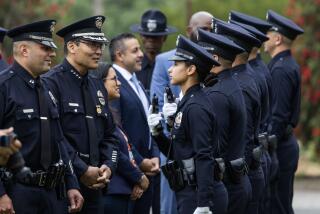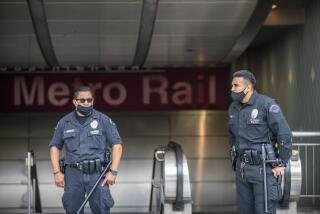Why Not a Police Corps?
- Share via
Police departments in big cities are fighting a losing battle against a tide of drugs, violence and other crimes. Putting more cops on the streets is one way to cope. At the very least, the law-abiding citizens would feel safer. But it is precisely the big cities whose budgets are too tight to pay for bigger police forces. In the few cities where the dollars are available, large numbers of well-qualified police recruits are hard to find.
Legislation sponsored by Arlen Specter (R-Pa.) in the Senate and Robert K. Dornan (R-Garden Grove) in the House would create a national Police Corps, patterned after the military’s Reserve Officer Training Corps, to encourage college graduates to serve on local police departments. Under the proposal, the federal government would provide college scholarships for men and women who agreed to serve as police officers for four years after graduation.
The Police Corps would recruit a maximum of 25,000 students a year. At full strength, 100,000 would participate at a federal cost of $500 million. Each of the 50 states would get a share, but no formula has been worked out.
Participants, primarily high school seniors and college undergraduates, would be selected on a competitive basis. The students would take out government-insured loans of up to $10,000 a year for tuition and other costs. Payment would be deferred. After the students completed college, the federal government would repay their debt and local governments would pay their salaries.
During college, participants would complete two federal law-enforcement training programs, each lasting eight weeks. After college, they would complete their department’s training requirements, for example a demanding session at the Police Academy. Functioning as sworn members of the department, they would earn entry-level pay, but they would not earn pension benefits and thus would cost a city less than other recruits.
The Police Corps, which is based on a concept developed by Adam Walinsky, a New York lawyer who was once Robert F. Kennedy’s chief aide, enjoys strong bipartisan support in Congress. Although several national police labor groups and management organizations approve, some big-city officers argue that the program is elitist and will produce officers who have no commitment to public safety. There will be a trade-off--youthful enthusiasm for years of experience--but the local departments can put the energetic new recruits to good use for as long as they stay--and for at least four years.
Recruiting in big cities gets harder and harder. The Police Corps would encourage thousands to join and reward them for their public service. It is well worth a try.
More to Read
Sign up for Essential California
The most important California stories and recommendations in your inbox every morning.
You may occasionally receive promotional content from the Los Angeles Times.













